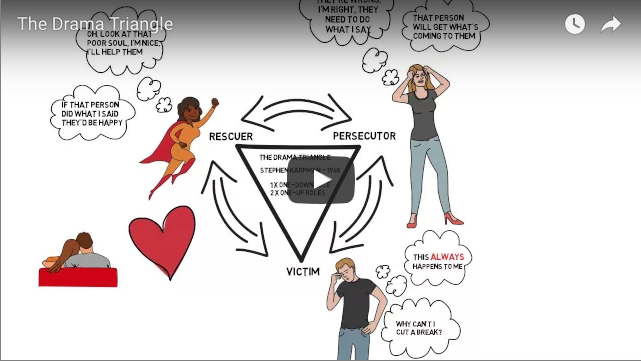One of the big mind-blowing paradigm shifts for me when I entered recovery was learning about the Drama Triangle.
This was totally new information for me, and it opened my eyes to seeing a whole different perspective on my own behavior in many relationships.
You will find the Drama Triangle in the Recovery Models illustrating the Distressed Marriage. The Model explains:
At the center of the distressed marital relationship we see the Drama Triangle. Ironically, both partners often take turns playing out the roles of rescuer, persecutor and victim. There may even be seasons of relative calm. Such calm, however, is usually based on apathy toward one another and projects a false sense of well being.
For me, understanding these 3 different roles, and understanding how each one of them is equally dysfunctional and unhealthy opened the door to allow myself to make different choices in troubling relationships that had followed the same old dead-end patterns for years.
This video does a fairly good job of explaining each role of the Drama Triangle. While I don’t particularly agree with the way they suggest of “fixing” the Drama Cycle by slightly shifting the role you are playing, I still feel the explanation is interesting and informative.
For me, freedom from the Drama Triangle comes as I try to step entirely out of the cycle, put God at my center, and detach from the interaction with love.
This usually means approaching the interaction from an entirely different perspective.
This can be difficult, because it oftens means I will be perceived as “the bad guy,” since everyone who is still functioning in the Drama Triangle is still fighting for the golden cup of “Biggest Victim.” That is usually a difficult pill for me (A Starting Gate “Rescuer”) to swallow. It takes a lot of courage, faith, and trust in my Higher Power to let go and accept that I cannot control the way others perceive me, and that if I try to, I will lose the ability to find my own serenity.
While stepping out of the Drama Triangle often feels uncomfortable and vulnerable, my experience has been that it is a necessary part of my recovery.
Recognizing the Drama Triangle when it is happening and choosing to detach from it is a practice that brings more serenity and awareness to my daily life.
It helps me to keep God at my center, and I believe that, in time, will allow me to have healthier relationships with both my Higher Power and all the imperfect people I love who are trying to love imperfect me the best way they know how.
What insights have you gained from the Drama Triangle?








I love this topic! When I first heard about this idea it was new to me too. I could see pretty quickly how this idea played out in almost all of my relationships. My “normal” way of showing up was normally 1. Rescuer= I can help with that! All of it! Just do this and this and this and this!!! 2. Persecutor= “well, it’s not my fault it didn’t work out, you didn’t do what I told you to.” 3. Victim= now everyone is mad at me and I was only trying to help. This always happens to me.”
As a “starting gate rescuer” myself I set a boundary for myself as I first started working to opt out of the drama triangle. “Say no to everything that was extra. Slow down. If I feel like I should help after the initial conversation then go back and say, “I gave it some thought and feel like I would be able to do this and this.”
Another mantra I used to say to myself while working to choose out of the rescuer role is, ” so and so has a Savior and it is not me. If I say no, He can help them meet their needs.”
I still forget these tools all the time and find myself taking on too much. Thank you for the reminder that this is not healthy behavior!
Thanks Kahi! I love that you mention setting boundaries to protect yourself from falling back into old unhealthy patterns. I have also needed to do this or I turn into a Rescuer without even realizing it. It’s certainly an on-going practice!
I too was blown away with first learning about the drama triangle. It made so much since to me as it was explained by my therapist. I love how the video is so visual. It explains it in a way that helps me understand how to not be stuck in it. I would usually show up as the victim. And just like Kahi mentioned I forget sometimes this triangle and how unhealthy it is. This is such a good reminder.
This was an eye opening experience. I could have written the post by Kahi. 1. Rescue 2. Persecutor and 3. Victim. Not proud to see myself so clearly in these 3 roles but I am admitting it. OUCH! Now to go about setting boundaries to keep me out of this triangle. One step at a time, one day at a time.
The drama triangle shouldn’t be applied to victims of abuse & trauma. The drama triangle applied to victims stems from the old incorrect codependency beliefs that wives are just as messed up as the addict.
Kate,
Thanks for your comments. I appreciate your point–victims of abuse and trauma are not responsible for the actions of others in any way. However, in my experience the drama triangle has really enlightened my understanding of how I interact in all relationships–not just my relationship with my addict. It has been empowering to see the role I have played in conflicts where I previously felt stuck. For me, understanding the drama triangle has opened my eyes to the limitless options I have to make healthier choices starting from the only place I truly have control–my own attitudes and behavior.